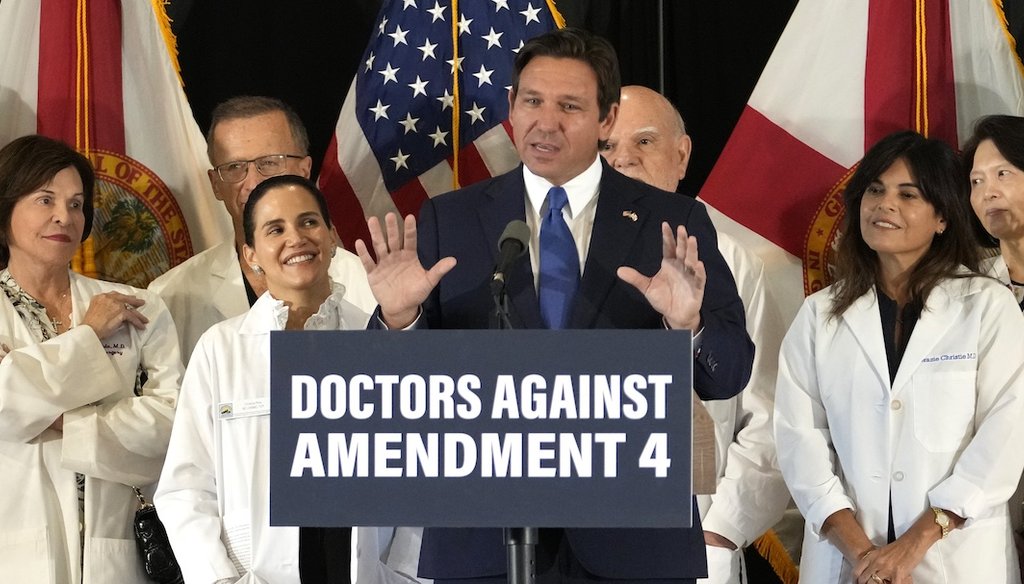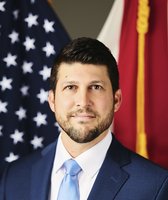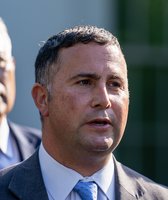Stand up for the facts!
Our only agenda is to publish the truth so you can be an informed participant in democracy.
We need your help.
I would like to contribute

Florida Gov. Ron DeSantis speaks out against Amendment 4 on Oct. 21, 2024, during a news conference with Florida Physicians Against Amendment 4 on in Coral Gables. (AP)
Florida Gov. Ron DeSantis has marshaled extensive state resources in his battle against Amendment 4.
State agencies he controls launched a website and TV ads against Amendment 4, which would enshrine abortion access in the state constitution if it clears 60% of voter approval. DeSantis’ voter fraud unit investigated the amendment’s verified signatures, an effort that included state police knocking on voters’ doors. The investigation culminated in a 348-page report that accused Amendment 4 organizers of illegally paying petition circulators for the number of signatures they collected.
DeSantis’ health department pressured TV stations to stop airing a pro-Amendment 4 ad through cease-and-desist letters. Floridians Protecting Freedom’s "Caroline" ad featured a woman who said the state’s six-week law wouldn't have allowed her to get an abortion so she could begin cancer treatment, which the state disputes.
At least one station stopped airing the ad, prompting a lawsuit against the state’s surgeon general by the amendment’s sponsors. On Oct. 17, a federal judge ordered the DeSantis administration to stop threatening stations over the ad. The Department of Health lawyer who signed off on the letters abruptly resigned to avoid having to send more.
These anti-Amendment 4 warnings from DeSantis, the state and the Republican Party of Florida are rooted in dubious claims about what the amendment would do.
A Vote No on 4 ad summed them up in less than 30 seconds: "The word viability, never defined," the ad’s narrator said. "The word doctor, never used. Amendment 4 even eliminates parental consent for minors. That’s not an accident. That’s their plan: Abortions at any time, for almost any reason, no doctors, no limits."
DeSantis repeated these talking points in an Oct. 21 press conference in Coral Gables, claiming the amendment would "mandate late-term abortions" and that it "eliminates the need to have doctors involved at all."
But these claims distort Amendment 4 and what it could mean for Floridians.
PolitiFact has evaluated several similar statements by Amendment 4’s opponents this election season. Here is what we found for each.
In another fact-check, we examined a claim by Amendment 4’s supporters that Florida’s six-week law has "no real exceptions. Not for her health. Not even for rape." The exceptions for rape, incest and the pregnant woman’s health are narrow and include obstacles, but an ad left a misleading impression.
Claim: The amendment would "mandate" abortion up to birth.
Ruling: False.
The amendment does not "mandate" that abortions be provided up to birth. It would overturn the state’s ban on abortions after six weeks of pregnancy and allow abortions up to "viability" of the fetus "or when necessary to protect the patient’s health, as determined by the patient’s health care provider." A full-term pregnancy is around 40 weeks.
Health care providers place fetal viability between 22 and 25 weeks of pregnancy. Neonatal survival rates around this point vary depending on the fetus’s size and health, the pregnant woman’s health, and the health care facility’s capabilities.
Florida statute defines viability as "the stage of fetal development when the life of a fetus is sustainable outside the womb through standard medical measures." The amendment would not change this definition.
Some critics claim that the amendment’s allowing for abortions past viability when "necessary to protect the patient’s health" means women could get abortions for any reason, at any point.
In the U.S., more than 90% of abortions take place in the first trimester. Less than 1% are performed after 21 weeks and typically involve an emergency or fatal fetal anomaly. Florida recorded three third-trimester abortions since 2020, all in 2024, because of serious or fatal fetal abnormalities.
Claim: The amendment allows "anyone" to approve and perform abortions.
Ruling: False.
The amendment says pregnant women can qualify for postviability abortions when a "health care provider determines it’s necessary" to protect their health. Although the initiative doesn’t define "health care provider," legal experts told us it would not allow people who aren’t licensed to provide health care to determine whether a patient qualifies for the health-risk exception.
Florida statutes use and define "healthcare provider" and "practitioner" in different ways, depending on the regulation. Florida’s Department of Health would determine the definition of health care provider for abortions. The state court system may weigh in if the amendment passes and faces legal challenges.
Florida doctors are regulated by the state’s Board of Medicine, and must follow medical ethics and standards of practice, or risk discipline, which could include losing their license. Practicing medicine unlicensed is illegal.
Claim: Amendment 4, unlike other amendments, has no definitions. Without definitions these words can mean almost anything.
Ruling: Mostly False.
Five of Florida’s six ballot measures in 2024, including Amendment 4, don’t include definitions. The other four definition-free measures came from the Legislature.
If the amendment passes, terms such as "viability," "patient’s health" and "healthcare provider" may need clarifying as the state codifies it, legal experts said. Any perceived ambiguity could raise legal challenges that leave courts with the final say.
"Most laws have no built-in definitions. That doesn’t mean the words they use have no limitation," Ilya Somin, a George Mason University law professor previously told us. "Words like ‘abortion,’ ‘health care provider,’ and so on all have understood meanings in ordinary usage, so they are not infinitely flexible."
Definitions aren’t required in state constitutional amendments, as long as the amendments are clear to voters, which the Florida Supreme Court ruled Amendment 4 was. Many of Florida's 144 constitutional amendments do not include definitions.
Claim: The amendment eliminates parental consent for abortions.
Ruling: This needs to be court-tested.
The amendment doesn’t spell out the immediate end of parental consent for abortions. But critics warn that the amendment’s language against anything that "prohibits," "delays" or "restricts" abortion could challenge a 2020 state law requiring written parental consent for minors to get abortions.
What happens to the consent law could be left up to the courts.
Legal experts said it’s possible that the state Supreme Court, given its conservative bent, would uphold Florida’s existing law. Justices could determine that parents have traditionally had a legal right to have a say in their children’s health care decisions, and therefore still have a say here.
Amendment 4 specifies that it "does not change the Legislature’s constitutional authority to require notification to a parent or guardian before a minor has an abortion." Opponents argue that parental notification is not the same thing as consent.
Another wrinkle: The 2020 consent law became enforceable April 1, when the state Supreme Court ruled that the constitutional protection of privacy didn’t apply to abortions.
A 1989 Florida Supreme Court case had invalidated an earlier parental consent law for minors seeking abortions on the grounds that it violated the state’s constitutional right to privacy, Louis Virelli, a Stetson University law professor, said. So, although critics have a point that the initiative could eventually eliminate the consent requirement, Floridians until April did not have one for more than 30 years.
Our Sources
PolitiFact, No, a Florida ballot measure wouldn’t ‘mandate abortion up to birth,’ as Gov. Ron DeSantis said, April 30, 2024
PolitiFact, Florida abortion amendment wouldn’t let tattoo artists, receptionists decide health risk exceptions, May 10, 2024
PolitiFact, If Florida’s abortion rights amendment passes, courts will weigh parental consent question, May 1, 2024
PolitiFact, Florida's Amendment 4 on abortion is short. Does a lack of definitions mean no rules?, Sept. 23, 2024
Please see sources linked in story.








































